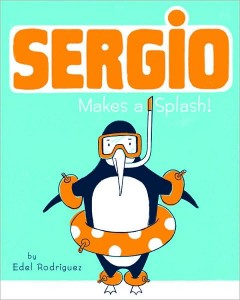Yesterday I wrote about how we got our daughter to swim by telling her that she couldn’t.
I want to just add, briefly, that it is not always a good thing, this humiliating your child with various burning words.
Case in point: on return from that same gloriously flamingo’d state where Dalia learned to swim, we had a layover in Tampa. And we sat here, we sat there. Our Continental was delayed two hours, so we sat somewhere else. And in the last place that we, as a family, sat, we were seated directly behind some kind of grandmother from hell, and her two tortured grandchildren.
These kids were older. Maybe 7 and 9? The younger a boy, the older a girl. They were by far not the worst kids I’ve seen in an airport environment. But there had been some running. Maybe some bickering. Apparently the boy burped. I know this because the grandmother started talking on her cell phone, and talking about the burp and other transgressions, with someone whom she apparently felt bore responsibility for these uncouths.
I should say, at this point, that this grandmother was Asian: perhaps Filipino. Her grandkids were mixed. Not that it has anything to do with the matter at hand: this was no Tiger Mom. It was Batshit Mom.
“I don’t know what to do with these children,” she said loudly.
“They have no class.”
“They are just burping. And they are farting. They are making me look bad.”
“I think you have to come and pick them up. I don’t want anything to do with them, ever. They are so disgusting.”
Of course, this was inside security at an airport; there would be no picking the kids up. But she didn’t want to have the kids picked up. She probably wasn’t even talking to a live person on the other end of her phone call. Her audience was seated right next to her–the kids. And–bravo!–her little monologue had its intended effect: the kids, those sinful creatures, started crying.
But it was not enough for grandma.
“They are just terrible. I knew they would be. And now they make so much noise, everybody looking at them, thinking what bad kids they are.” And so on and so on.
I had that same urge that I have when some mother, say, smacks her kid in public, which is to butt in, and interrupt, and correct and scold the adult. And I did what I always do in those situations as well, which is: nothing. It’s not just my bystanderish nature; it’s perhaps even a good idea. Humiliating a humiliator could just worsen whatever treatment the children get, even as it pushes it out of eyesight. But that could be a self-justification for inaction. I don’t know.
My own dilemma, pathetic as it was, was ended by our flight boarding. The kids, however, were stuck there with this woman, this crone, this abuser of children. And worse, she is their blood.


